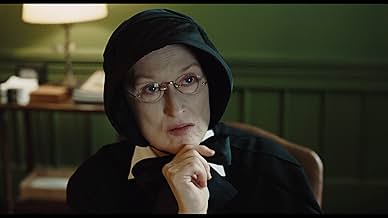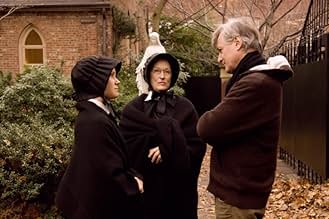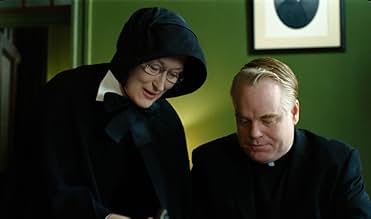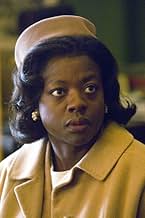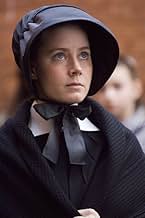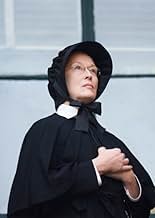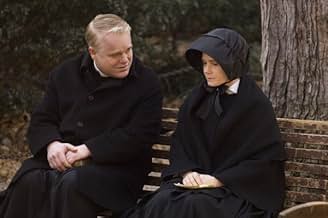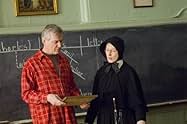A diretora de uma escola católica questiona a relação ambígua de um padre com um jovem estudante problemático.A diretora de uma escola católica questiona a relação ambígua de um padre com um jovem estudante problemático.A diretora de uma escola católica questiona a relação ambígua de um padre com um jovem estudante problemático.
- Direção
- Roteirista
- Artistas
- Indicado a 5 Oscars
- 25 vitórias e 97 indicações no total
Joseph Foster
- Donald Miller
- (as Joseph Foster II)
Avaliações em destaque
I'm not going to give a long or exhaustive review. A bazillion others have and the movie was released over a year ago--so my giving any sort of in-depth analysis is just needless repetition.
The movie's biggest strength is the acting. All three leading actors did a fine job and this was necessary to carry a film that has no special effects, explosions or love scenes. The vagueness of the film is also a strength. After all, the film gets you thinking and yet there is definitely no clear-cut answer as to what really occurred in the film. There is lots of room to foster discussions and debate. And, while I am a strongly opinionated person, I wouldn't have changed much of the film at all--except the very, very end when Meryl Streep's character, for the first and only time, shows some doubt and emotion. This just didn't seem true to her character. Still, this is a minor concern--and who am I to say, since I didn't win the Pulitzer Prize (last time I checked)! Some may hate the vagueness and want a very clear explanation as to what, exactly, the Father did--if anything. Some may hate that the film actually isn't vague enough (I slightly tend towards that). But what I love about all this is that so many different people see so many different things--mostly based on their own prior experiences and expectations. I could easily see someone seeing gay issues, pedophilia (and it's talked ABOUT but never even explicitly said) or a thousand other possibilities--or it could simply be a metaphor for McCarthyism. Who knows? And that makes the film so interesting.
The movie's biggest strength is the acting. All three leading actors did a fine job and this was necessary to carry a film that has no special effects, explosions or love scenes. The vagueness of the film is also a strength. After all, the film gets you thinking and yet there is definitely no clear-cut answer as to what really occurred in the film. There is lots of room to foster discussions and debate. And, while I am a strongly opinionated person, I wouldn't have changed much of the film at all--except the very, very end when Meryl Streep's character, for the first and only time, shows some doubt and emotion. This just didn't seem true to her character. Still, this is a minor concern--and who am I to say, since I didn't win the Pulitzer Prize (last time I checked)! Some may hate the vagueness and want a very clear explanation as to what, exactly, the Father did--if anything. Some may hate that the film actually isn't vague enough (I slightly tend towards that). But what I love about all this is that so many different people see so many different things--mostly based on their own prior experiences and expectations. I could easily see someone seeing gay issues, pedophilia (and it's talked ABOUT but never even explicitly said) or a thousand other possibilities--or it could simply be a metaphor for McCarthyism. Who knows? And that makes the film so interesting.
Watch this movie once, with the idea that Fr. Flynn is guilty. Then watch it again, with the idea that he is innocent. Or do it the other way around. Shanley's dialogue is so perfectly, brilliantly ambiguous that this is really two movies in one. Both are powerful, and both possibilities are horrible to contemplate, for very different reasons.
Having seen both the play (during its original run with Cherry Jones and Brian F. O'Byrne) and the film, the play obviously has the edge because it's more intimate, consisting only of four characters. The film expands its milieu (as film versions of plays typically do) but I think having the schoolchildren, other nuns, and school staff present in the film diminishes it just a bit. The play, of course, is about "knowing" things that we don't actually know, and the movie shows us some of what the play leaves to the imagination. Although the ultimate question remains ambiguous, the viewer may be distracted by looking for clues in the other characters, especially the kids.
What gives this piece its power, though, on both stage and screen, is its stubborn refusal to answer that ultimate question, or to provide any solid evidence of either conclusion, leaving it entirely up to the viewer to judge these characters.
Having seen both the play (during its original run with Cherry Jones and Brian F. O'Byrne) and the film, the play obviously has the edge because it's more intimate, consisting only of four characters. The film expands its milieu (as film versions of plays typically do) but I think having the schoolchildren, other nuns, and school staff present in the film diminishes it just a bit. The play, of course, is about "knowing" things that we don't actually know, and the movie shows us some of what the play leaves to the imagination. Although the ultimate question remains ambiguous, the viewer may be distracted by looking for clues in the other characters, especially the kids.
What gives this piece its power, though, on both stage and screen, is its stubborn refusal to answer that ultimate question, or to provide any solid evidence of either conclusion, leaving it entirely up to the viewer to judge these characters.
There are no better actors working in American film today than Meryl Streep and Phillip Seymour Hoffman. Streep has been on top for some time now and Hoffman has an unmatched resume of fine performances over the past five years. Pairing off as adversaries in John Patrick Shanley's stage play brought to screen they parry and prod throughout with each landing hay makers along the way.
Change is in the wind in 1964 for both the world and the Catholic Church (Second Vatican Council) as the country moves from conservatism to liberal thought. Sister Aloysius (Streep)is the principal of an inner city Catholic school who rules with an iron fist. Lamenting the loss of tradition (she thinks Frosty the Snowman is a song about worshiping false idols) she crosses swords with the popular and laid back Father Flynn who takes a more liberal view seeing the need to keep up with the times. His progressive ways gnaw at Sister Aloysius and she is soon suspecting Father Flynn of inappropriate relationship with altar boys even though she is without concrete proof.
The scenes between Streep and Hoffman are riveting from start to finish. Both attempt at first to be civil with each other but eventually they end up at each others throat bullying and threatening. It is a titanic emotional struggle that makes for a gripping drama flawlessly acted. I'm no big fan of Streep, finding the adopted accents she employs in some of her films false and hollow, but as the self righteous Nunzilla her pugnacious style and inflection rates with her Sophie's Choice performance. Hoffman has his work cut out for him to keep up with the formidable legend but he holds his own with equal footing.
In supporting roles Amy Adams is very effective as the unintended go between Sister James. Seized with doubt she like the audience mirrors our own misgivings as conflicted objective observers. Viola Davis as a troubled boy's mother has one lengthy powerful and painful scene that begins to tie loose ends together but offers no easy solution.
Writer director John Patrick Shanley does an admirable job in keeping the plot nebulous with ambivalent scenes and peripheral characters that purposefully enhance the suspense. Scenes are tightly edited with sparse but effective dialog giving the film its steady pace. Other than some jarring oblique angle shots the camera compositions and set design provide a somber ambiance for the drama and an arena for the perfectly measured performances by two masters of the craft in this fight to the finish that remains absorbing from beginning to end.
Change is in the wind in 1964 for both the world and the Catholic Church (Second Vatican Council) as the country moves from conservatism to liberal thought. Sister Aloysius (Streep)is the principal of an inner city Catholic school who rules with an iron fist. Lamenting the loss of tradition (she thinks Frosty the Snowman is a song about worshiping false idols) she crosses swords with the popular and laid back Father Flynn who takes a more liberal view seeing the need to keep up with the times. His progressive ways gnaw at Sister Aloysius and she is soon suspecting Father Flynn of inappropriate relationship with altar boys even though she is without concrete proof.
The scenes between Streep and Hoffman are riveting from start to finish. Both attempt at first to be civil with each other but eventually they end up at each others throat bullying and threatening. It is a titanic emotional struggle that makes for a gripping drama flawlessly acted. I'm no big fan of Streep, finding the adopted accents she employs in some of her films false and hollow, but as the self righteous Nunzilla her pugnacious style and inflection rates with her Sophie's Choice performance. Hoffman has his work cut out for him to keep up with the formidable legend but he holds his own with equal footing.
In supporting roles Amy Adams is very effective as the unintended go between Sister James. Seized with doubt she like the audience mirrors our own misgivings as conflicted objective observers. Viola Davis as a troubled boy's mother has one lengthy powerful and painful scene that begins to tie loose ends together but offers no easy solution.
Writer director John Patrick Shanley does an admirable job in keeping the plot nebulous with ambivalent scenes and peripheral characters that purposefully enhance the suspense. Scenes are tightly edited with sparse but effective dialog giving the film its steady pace. Other than some jarring oblique angle shots the camera compositions and set design provide a somber ambiance for the drama and an arena for the perfectly measured performances by two masters of the craft in this fight to the finish that remains absorbing from beginning to end.
Wow! Incredible performances from Meryl Streep and Philip Seymore Hoffman. Mesmerizing intensity from Streep as the nun seeking to find Hoffman guilty of a sin he may or may not have committed. Amy Adams gives a sincere performance as the nun who sets the ball rolling with her suspicions that Hoffman may have molested a black student. The scenes between Streep and Hoffman crackle with intelligence and frightening intensity. Streep, as the unrelenting figure of justice, determined at any cost to destroy Hoffman, is terrifying and unrelenting. Hoffman gives a performance less restrained and mannered than the one he gave in Capote (and won the Oscar for) and boy, does he ever deserve to have won a second one for this outing. An absolute knockout, nuanced and convincing in every way. What a masterful performance! John Patrick Shanley's script is riveting from start to finish. If anyone has any doubts about watching this movie due to the theme then put those doubts aside as the writing and acting are without doubt amongst the finest ever committed to film. A superb piece of work.
Doubt is a movie that pulls no punches and wastes no time. It is about a nun who suspects a priest of having an inappropriate relationship with a student in their school. I had fully anticipated that there would be a slower build to the confrontations in the story, but I'm not sure why I thought that might happen. Considering how brash and brazen Meryl Streep plays the Principal of the school, I should have known that subtlety wasn't going to be her preferred method of handling things. Her first confrontation with the priest was a heart-pounding scene that almost made my palms sweat as if I was part of the uncomfortable situation. It was perfect that they chose to also have Amy Adams there to offer a contrast as someone who wants to avoid the conflict.
I applaud Doubt for some wonderful acting performances across the board. This movie features an all-star level of talent, and they have some serious dramatic scenes that feel tailor-made for Oscar nominations. The film is hard to watch, though. I almost squirmed right out of my chair during the scene with Viola Davis, and there are several scenes with a similar tone. It doesn't have a cathartic release at the end, in fact many of the worst elements of the plot never feel resolved. There's an uncomfortable ugliness to the way things play out in this movie, and it makes me want to watch Spotlight right after so I feel satisfied that something more has been done. Doubt is one of those movies where I respect it more than I like it. There's no denying this is quality film-making, but it is not the kind that I want to subject myself to many times in the future.
I applaud Doubt for some wonderful acting performances across the board. This movie features an all-star level of talent, and they have some serious dramatic scenes that feel tailor-made for Oscar nominations. The film is hard to watch, though. I almost squirmed right out of my chair during the scene with Viola Davis, and there are several scenes with a similar tone. It doesn't have a cathartic release at the end, in fact many of the worst elements of the plot never feel resolved. There's an uncomfortable ugliness to the way things play out in this movie, and it makes me want to watch Spotlight right after so I feel satisfied that something more has been done. Doubt is one of those movies where I respect it more than I like it. There's no denying this is quality film-making, but it is not the kind that I want to subject myself to many times in the future.
Você sabia?
- CuriosidadesPhilip Seymour Hoffman lobbied for Amy Adams to be a part of the movie, even threatening to leave the project if she wasn't cast.
- Erros de gravaçãoSister Aloysius says the people of ancient Sparta resolved issues by who shouted the loudest. It was actually the ancient Athenians who did that.
People, even nuns, sometimes mix up history facts.
- Citações
Father Brendan Flynn: Doubt can be a bond as powerful and sustaining as certainty. When you are lost, you are not alone.
- ConexõesFeatured in The 14th Annual Critics' Choice Awards (2009)
- Trilhas sonorasReginella Campagnola
Written by Eldo Di Lazzaro, Bruno Cherubini (as C. Bruno)
Principais escolhas
Faça login para avaliar e ver a lista de recomendações personalizadas
Detalhes
- Data de lançamento
- País de origem
- Centrais de atendimento oficiais
- Idioma
- Também conhecido como
- La duda
- Locações de filme
- Empresas de produção
- Consulte mais créditos da empresa na IMDbPro
Bilheteria
- Orçamento
- US$ 20.000.000 (estimativa)
- Faturamento bruto nos EUA e Canadá
- US$ 33.446.470
- Fim de semana de estreia nos EUA e Canadá
- US$ 507.226
- 14 de dez. de 2008
- Faturamento bruto mundial
- US$ 51.699.984
- Tempo de duração1 hora 44 minutos
- Cor
- Mixagem de som
- Proporção
- 1.85 : 1
Contribua para esta página
Sugerir uma alteração ou adicionar conteúdo ausente





